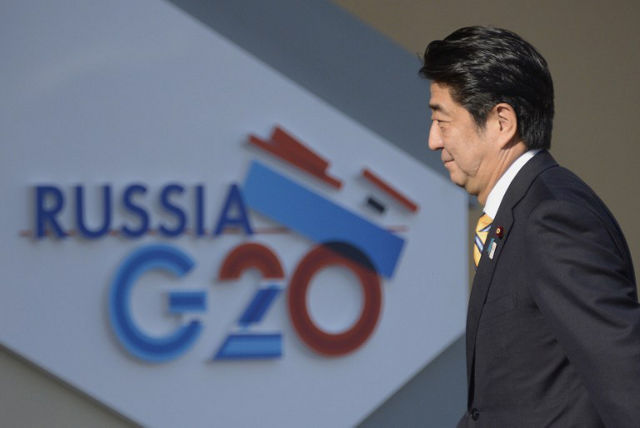SUMMARY
This is AI generated summarization, which may have errors. For context, always refer to the full article.

TOKYO, Japan (2ND UPDATE) – Japanese Prime Minister Shinzo Abe urged a reset in frayed ties with China when he met Chinese President Xi Jinping on the sidelines of the G20 summit, his spokesman said Friday.
The meeting was the first between leaders of the two countries since relations took a nosedive last year over the ownership of uninhabited islands, in a row that has led to warnings of a possible armed confrontation.
“Prime Minister Abe explained (to Xi) about our thoughts that we should develop Japan-China relations by going back to the original point of the strategic, mutually beneficial relationship,” Chief Cabinet Secretary Yoshihide Suga told reporters in Tokyo.
A Japanese embassy spokesman in Moscow said the two leaders shook hands and spoke for about five minutes at the meeting of world leaders in the Russian city of Saint Petersburg.
Despite the huge economic importance of the relationship between Asia’s two largest powers, the two men have not met since the hawkish Abe took office in December and Xi in March.
According to Chinese state news agency Xinhua, Abe said he had been looking forward to seeing Xi in Russia and that “I am eager to improve Japanese-Chinese relations”.
The agency cited Xi as telling Abe that Beijing wants to improve ties “on the basis of the 4 Chinese-Japanese political documents” – a reference to agreements hammered out from the early 1970s onwards as the two countries normalised relations.
The report said Xi had reiterated China’s position that Japan must address historical grievances.
Beijing regularly charges that Tokyo has not made sufficient amends for its aggressive and acquisitive behaviour in the middle of the 20th century, and that Japan plays down the extent of its wrongdoing.
Japan says it has apologised and maintains that Beijing uses history to beat its neighbour and as a rallying cry at home to distract domestic attention from problems.
Often-difficult relations between the world’s second and third largest economies worsened significantly in September last year when Japan nationalised islands it already controlled under the name Senkakus.
Beijing says the archipelago, which it calls the Diaoyus, was illegally snatched by Japan at the close of the 19th century, and demands the islands back.
Official Chinese ships – latterly the country’s coastguard – have regularly plied the waters around the islands in the East China Sea, where they are warned off by Japan’s coastguard.
The two countries’ militaries have also been involved, with fighter planes scrambled numerous times, although there has been no contact.
Observers warn the island spat has the potential to turn into an armed confrontation that risks dragging in other countries in the region.
While Tokyo has been careful to maintain its public position that it was always ready for talks with Beijing, Abe’s administration has been resolute in saying the islands’ sovereignty is not up for discussion.
Beijing has rebuffed a number of apparent Japanese overtures in recent months, including visits by senior aides to Abe.
Earlier Thursday, Qin Gang, China spokesman at the G20, said: “There are difficulties between China and Japan relations at the moment. Responsibility does not lie with China.”
“China’s position on Diaoyu is clear. The islands belong to China,” said Qin.
“The differences in views should be effectively managed through consultations. Unfortunately, China’s reasonable proposals have not been met with proper responses from Japan,” he said.
Qin added that relations between the two countries are “very important” but laid responsibility for improving them at Tokyo’s door, saying China hopes that Japan “will take concrete measures to improve ties”. – Rappler.com
Add a comment
How does this make you feel?
There are no comments yet. Add your comment to start the conversation.